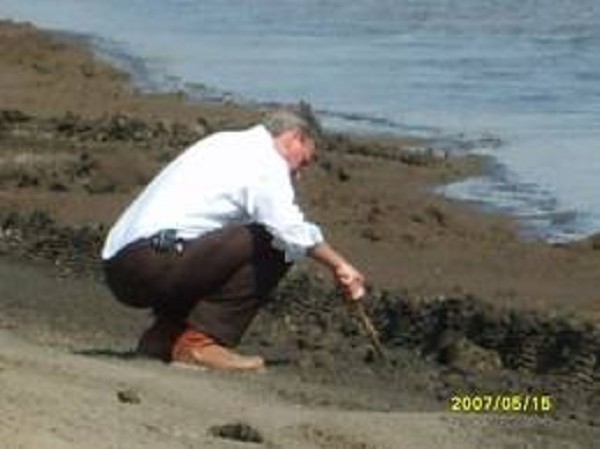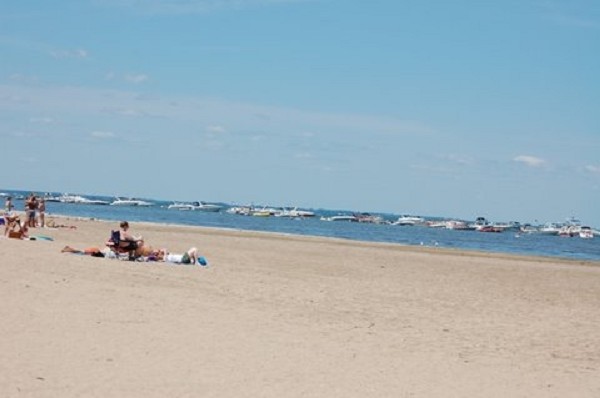NITROGEN THREAT: Is State Park Beach Muck From Excess Fertilizer, Manure?
|
||||||||||
| Printer Friendly Story View |

County official probes beach muck at Bay City State Recreation Area.

Beach draws throngs of swimmers to Bay City State Recreation Area, while boat flotilla anchors offshore.
The search for the source of muck on Saginaw Bay may be narrowing.
An article in the May issue of National Geographic may open some eyes here about the problem.
Agricultural experts conclude that a major cause of pollution is created in our lust for greater crop yields.
Nitrogen fertilizer is one main answer to higher crop yields.
But too much nitrogen is causing pollution.
Nitrogen comes not only from potash-based fertilizers but also from animal waste.
One theory being considered about the cause of muck on beaches at the Bay City State Recreation Area is that it stems at least in part from animal waste.
County Commission Chair Kim Coonan and Commissioner Ernie Krygier have been working for several years to clean the beach at the State Recreation Area and have been advocates for a variety of programs to address the problems.
An estimated 250,000 cattle and hogs are kept on factory farms in Huron and Tuscola counties. Their waste, along with fertilizer runoff from myriad farms, washes into drainage ditches and streams and ends up in Saginaw Bay.
Winds and wave action are believed pushing the nitrogen-laden waters toward Bay County, causing algae growth that makes up the muck on the beaches.
Bay County commissioners in February approved a grant application to the Michigan Department of Natural Resources (DNR) to install a boardwalk for swimmers to bridge the muck. This is a step up from the floating docks tried last year.
Match dollars for the $39,000 estimated cost of the project will be sought through the Saginaw Bay Watershed Initiative Network (WIN), the Bay Community Foundation and the Michigan Coastal Zone Management program to cover costs.
Scientists at Michigan State University's Kellogg Biological Research Station at Gull Lake near Kalamazoo are finding a need for balance to "save the planet," according to the NatGeo article.
Perhaps MSU scientists could save the beaches here, too.
National Geographic magazine this month features the work of MSU scientists in a thought-provoking article on the benefits and dangers of nitrogen.
China is the world's biggest offender, with an estimated 60 percent excess nitrogen from agriculture contributing to pollution and so-called "greenhouse gases." But India and the United States are guilty of overuse of nitrogen as well.
Dan Charles, National Public Radio's food and agriculture correspondent, interviewed Michigan State's Phil Robertson who is experimenting with nitrogen and crop yields at the Kellogg site.
"Each field planted according to standard plowing and fertilizer recommendations released 610 pounds of nitrogen per acre into Michigan's shallow groundwater over the past 11 years," wrote Charles.
About half of the fertilizer that's added we lose, Robertson says. This loss is much less than what's common in China. Yet when multiplied by tens of millions of acres of American cropland, it's enough to produce polluted groundwater, a nutrient-loaded Mississippi River, and an enormous dead zone in the Gulf of Mexico.
"The organic fields in Robertson's experiment, which received no commercial fertilizer or manure, lost only a third as much -- but those fields also produced 20 percent less grain. Intriguingly, the 'low input' fields, which received small amounts of fertilizer but were also planted with winter cover crops, offered the best of both worlds: Average yields were about as high as those from the conventional fields, but nitrogen leaching was much reduced, almost to the level of the organic fields. If America's farmers could cut their nitrogen losses to something close to this level, Robertson thinks, restored wetlands and revived small streams could clean up the rest.
"As in China, though, many farmers find it hard to change. When a family's livelihood is at stake, it may seem safer to apply too much fertilizer rather than too little. Being a good steward currently has economic consequences that are unfair," says Robertson.
| Printer Friendly Story View |
|
|

Dave Rogers |
|
|
|
Printer-Friendly Story View
0200 Nd: 04-21-2024 d 4 cpr 0
12/31/2020 P3v3-0200-Ad.cfm
SPONSORED LINKS
12/31/2020 drop ads P3v3-0200-Ad.cfm


